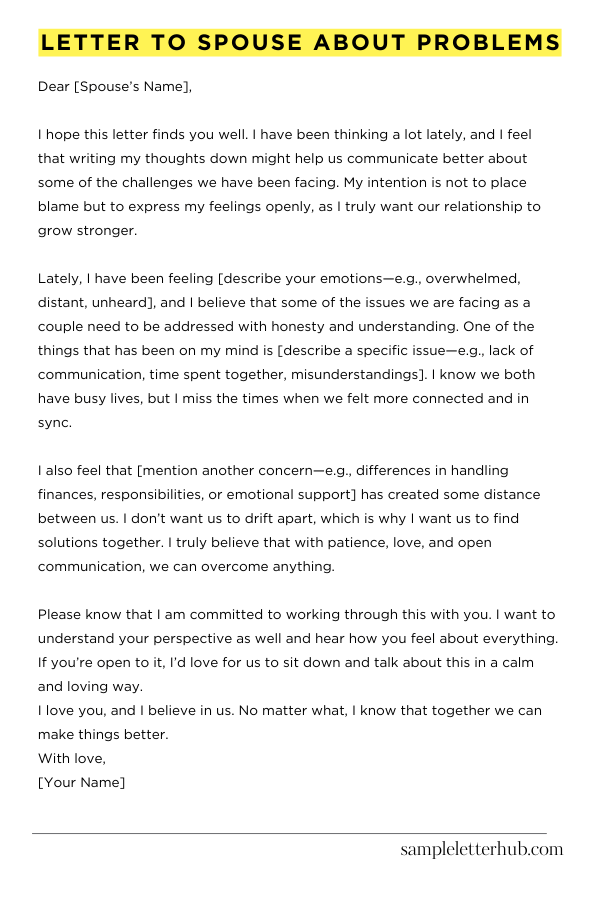A letter to spouse about problems is a way to communicate your concerns and feelings to your partner in a clear and concise way. It can be difficult to have these conversations in person, so writing a letter can be a helpful way to get your thoughts and feelings down on paper.
In this article, we will share some templates, examples, and samples of letters to spouse about problems. These letters can be used as a starting point for your own letter, or you can simply use them as inspiration.
We hope that these letters will help you to communicate your concerns to your partner in a way that is both respectful and effective.
Letter To Spouse About Problems
Dear [Spouse’s Name],
I hope this letter finds you well. I have been thinking a lot lately, and I feel that writing my thoughts down might help us communicate better about some of the challenges we have been facing. My intention is not to place blame but to express my feelings openly, as I truly want our relationship to grow stronger.
Lately, I have been feeling [describe your emotions—e.g., overwhelmed, distant, unheard], and I believe that some of the issues we are facing as a couple need to be addressed with honesty and understanding. One of the things that has been on my mind is [describe a specific issue—e.g., lack of communication, time spent together, misunderstandings]. I know we both have busy lives, but I miss the times when we felt more connected and in sync.
I also feel that [mention another concern—e.g., differences in handling finances, responsibilities, or emotional support] has created some distance between us. I don’t want us to drift apart, which is why I want us to find solutions together. I truly believe that with patience, love, and open communication, we can overcome anything.
Please know that I am committed to working through this with you. I want to understand your perspective as well and hear how you feel about everything. If you’re open to it, I’d love for us to sit down and talk about this in a calm and loving way.
I love you, and I believe in us. No matter what, I know that together we can make things better.
With love,
[Your Name]

Letter to Spouse About Divorce
Dear [Spouse’s Name],
I am writing to you today to inform you of my decision to file for divorce. This was not an easy decision, and I have given it much thought and consideration.
Over the past few years, we have grown apart and our relationship has become strained. We have tried to work through our differences, but unfortunately, we have been unable to resolve them.
I believe that it is in the best interests of both of us to end our marriage. I am no longer happy in this relationship, and I do not believe that we can reconcile our differences.
I know that this news will be difficult for you to hear, and I am truly sorry for any pain that I may cause you. I want you to know that I still care about you, and I wish you all the best in the future.
I have already consulted with an attorney, and I will be filing for divorce in the near future. I hope that we can work together to make this process as smooth and amicable as possible.
Sincerely,
[Your Name]
How to Write Letter To Spouse About Problems
1. Start with a positive note
Even though you’re writing about problems, it’s important to start your letter on a positive note. This will help to set the tone for the rest of the letter and make your spouse more receptive to what you have to say.
2. Be specific about the problems
Don’t just say that you’re having problems. Be specific about what the problems are. This will help your spouse to understand what you’re talking about and to see things from your perspective.
3. Use “I” statements
When you’re talking about the problems, use “I” statements. This will help you to take ownership of your feelings and to avoid blaming your spouse.
4. Be respectful
Even though you’re writing about problems, it’s important to be respectful of your spouse. This means listening to their point of view and trying to understand their feelings.
5. Be open to compromise
It’s unlikely that you’ll be able to solve all of your problems overnight. Be open to compromise and work together with your spouse to find solutions that work for both of you.
6. End on a positive note
Just as you started your letter on a positive note, you should also end on a positive note. This will help to leave your spouse with a good feeling and to make them more likely to want to work with you to solve your problems.
7. Get help if you need it
If you’re struggling to write a letter to your spouse about problems, don’t hesitate to get help. A therapist can help you to communicate your feelings in a healthy way and to develop strategies for solving your problems.
FAQs about Letter To Spouse About Problems
1. What are the most important things to include in a letter to my spouse about problems?
The most important things to include in a letter to your spouse about problems are:
- A clear and concise statement of the problem.
- A description of how the problem is affecting you.
- A list of possible solutions to the problem.
- A request for your spouse’s help in resolving the problem.
2. How can I write a letter to my spouse about problems without sounding accusatory?
When writing a letter to your spouse about problems, it is important to avoid sounding accusatory. Instead, focus on using “I” statements to express your feelings. For example, instead of saying “You never listen to me,” you could say “I feel hurt when I’m not listened to.”.
3. What should I do if my spouse is resistant to talking about the problems?
If your spouse is resistant to talking about the problems, it is important to be patient and understanding. Try to approach the conversation from a place of love and concern. Let your spouse know that you are not trying to attack them, but that you simply want to work together to resolve the issues.
4. How can I make sure that my spouse takes my letter seriously?
To make sure that your spouse takes your letter seriously, it is important to be clear and concise in your writing. Avoid using vague or ambiguous language. Be specific about the problems that you are experiencing and what you would like to see change.
5. What should I do if my spouse does not respond to my letter?
If your spouse does not respond to your letter, it is important to not give up. Try talking to your spouse in person about the problems. If that does not work, you may want to consider seeking professional help.

